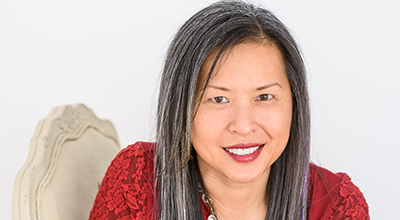I am NIMH: Q&A with Susanna Sung

Susanna Sung, LCSW-C
Director of Marketing & Community Relations
Intramural Research Program
What is your name and job title?
Susanna Sung, LCSW-C, Director of Marketing & Community Relations, Intramural Research Program.
I feel deeply grateful for the privilege of working with my colleagues. They are the smartest, kindest, most gracious, and most hard-working people I’ve ever met.
How would you summarize what you do?
I oversee participant recruitment for our Intramural Research Program clinical studies. It’s more than creating advertising campaigns, community partnerships, and recruitment materials. It starts with understanding what each protocol is asking and the target population. It turns into identifying and addressing participants’ access to and understanding of research opportunities and barriers to participation.
Participant recruitment is so much more than placing ads for a study. To be effective, it’s important to understand the system you’re in and how it works. It’s also important to know how people obtain their information and how to provide clear messaging about our work, and why it matters. I take all of that to build messaging and trust to address the problem that not enough people know about or have access to our research opportunities.
How did you come to NIMH?
I was providing clinical care and working on research in the community and was so frustrated at how evidence-based practices weren’t trickling down to the community level. This position encapsulated all my skills and interests--mental health, research, and communications--and I hoped to make a difference in this role.
How long have you worked at NIMH?
23 years, but who’s counting?
What makes you want to stay at NIMH?
The mission and the people. I firmly and deeply believe in our mission to transform our understanding and treatment of mental illnesses. I believe how we as a country treat our most vulnerable reflects our values and humanity. I think we must do better for all of humanity because we are all touched by mental illnesses in some way.
I’ve also stayed for the people. I’ve been so fortunate, and I feel deeply grateful for the privilege of working with my colleagues. They are the smartest, kindest, most gracious, and most hard-working people I’ve ever met. They make me a better person every day.
What is your favorite part of your job?
Getting to “Yes.” As part of the federal government, there are additional policies and regulations that the private sector does not have. It can be difficult to navigate a large and complex system. For various reasons, there’s often no clear and easy path from Point A to Point B. Part of my training is as a social worker, and I love bringing my social work skills and perspective into my work. Getting to “Yes” requires problem formulation, knowledge of systems and group dynamics, coalition building, communication skills, assessment of motivation, and so many other social work skills. Getting to “Yes” in an administrative or macro space is a way of problem-solving and being effective from a traditional strengths perspective.
What would you tell a friend if they were considering working here?
This is a wonderful place to work if you want to make a difference in the world. Every job here matters in advancing our understanding of mental illnesses. It takes a very large village with many moving parts. We don’t take our mission lightly here. It’s important work, and there’s a lot of passion, brilliance, and dedication here.
What’s one life lesson you’ve learned from your career?
There’s always a way. It may take a different path and unfold in a longer timeframe than you’d like, but there’s always a way forward to meet the intent of what you’re trying to do.
What is a benefit of working here that not many people know about?
Continuing professional education is everywhere. There are always meetings, seminars, and conferences with the world’s experts in every field. It’s such a rich environment of constant learning, and it keeps you alive and yearning for more. This is a place of continuous growth if you look for the opportunities.
If you weren’t doing this job, what would you be doing?
Being a rock star! Or an activist. Probably both—a rockin’ activist.
